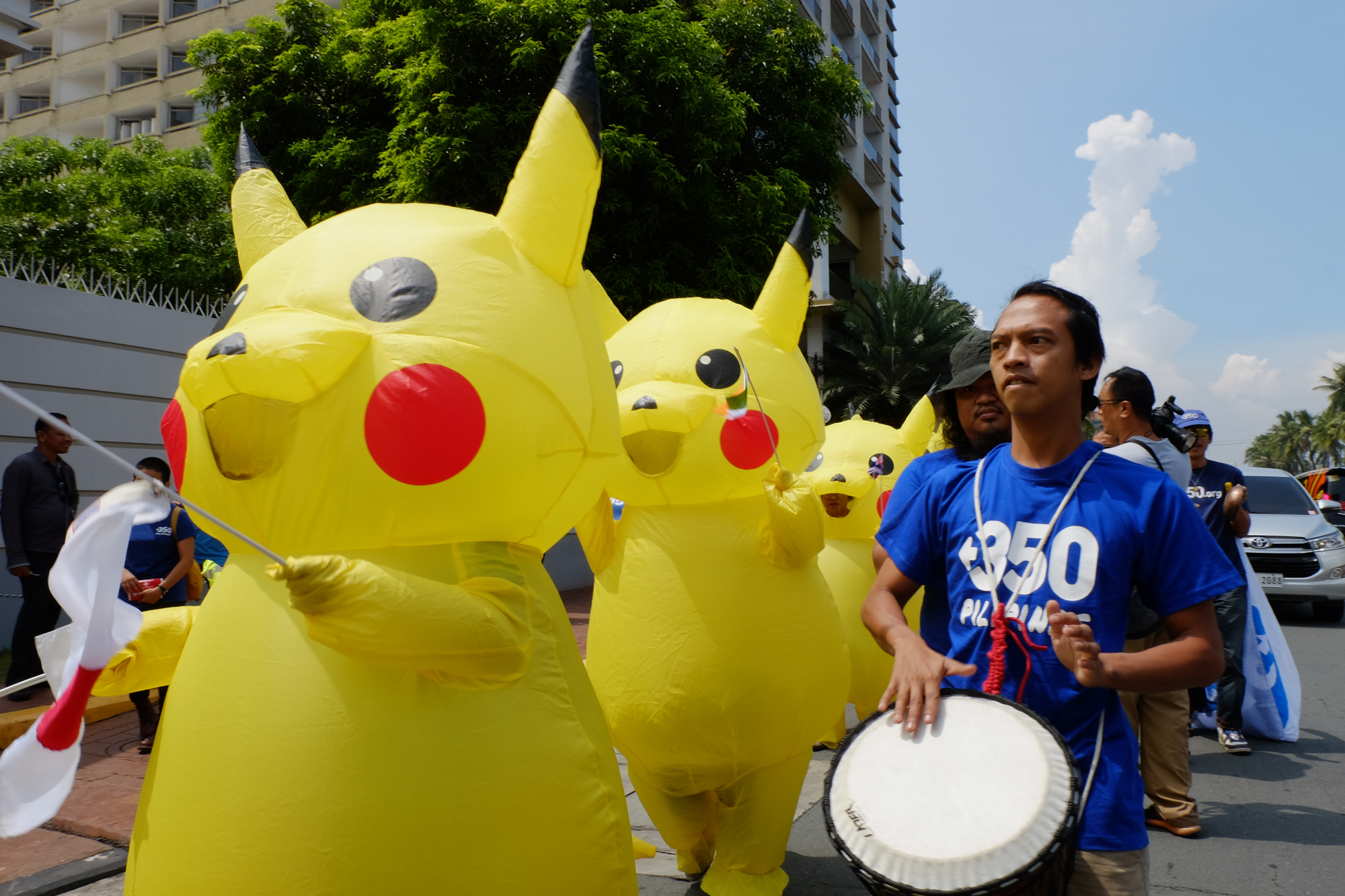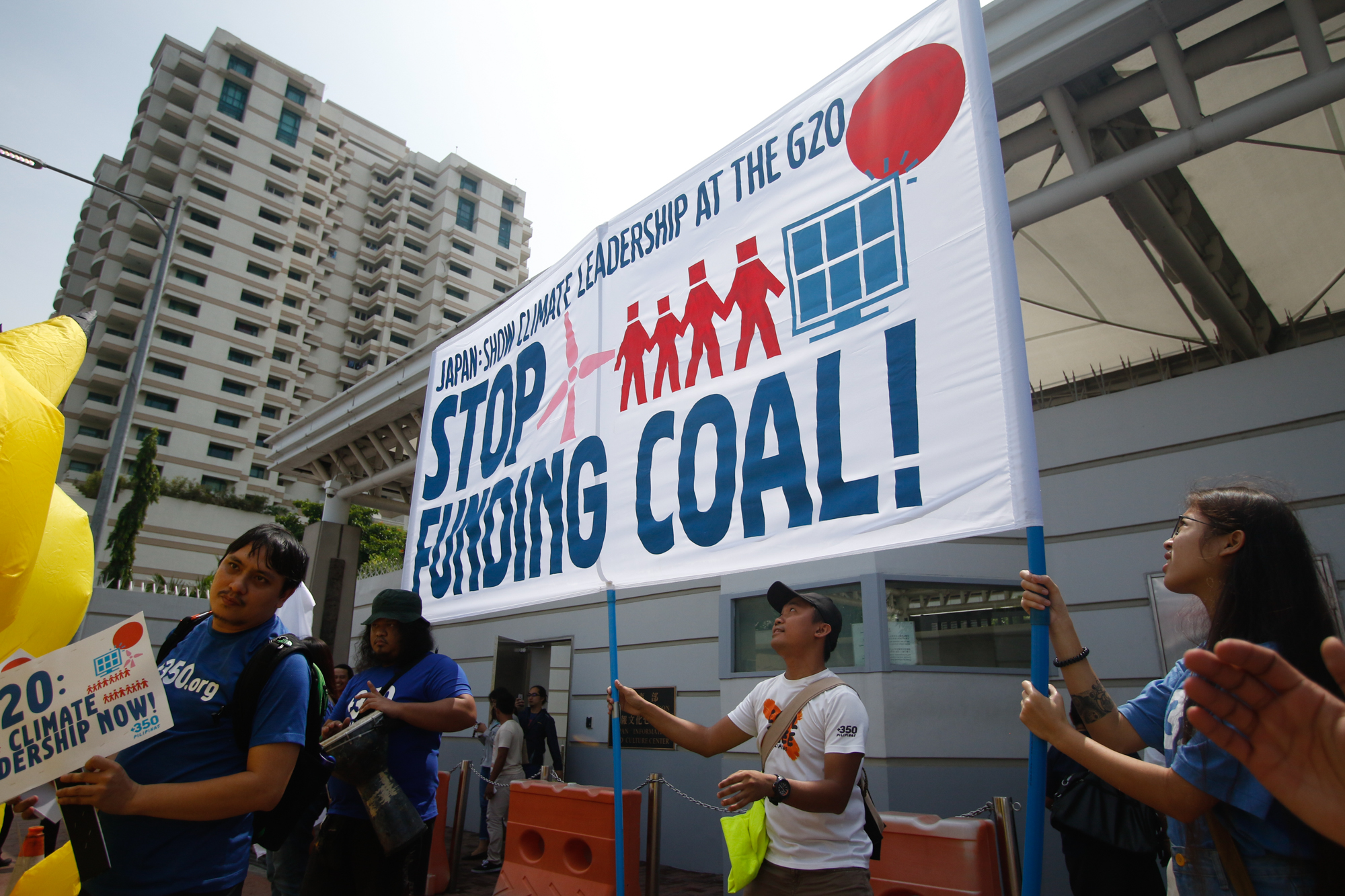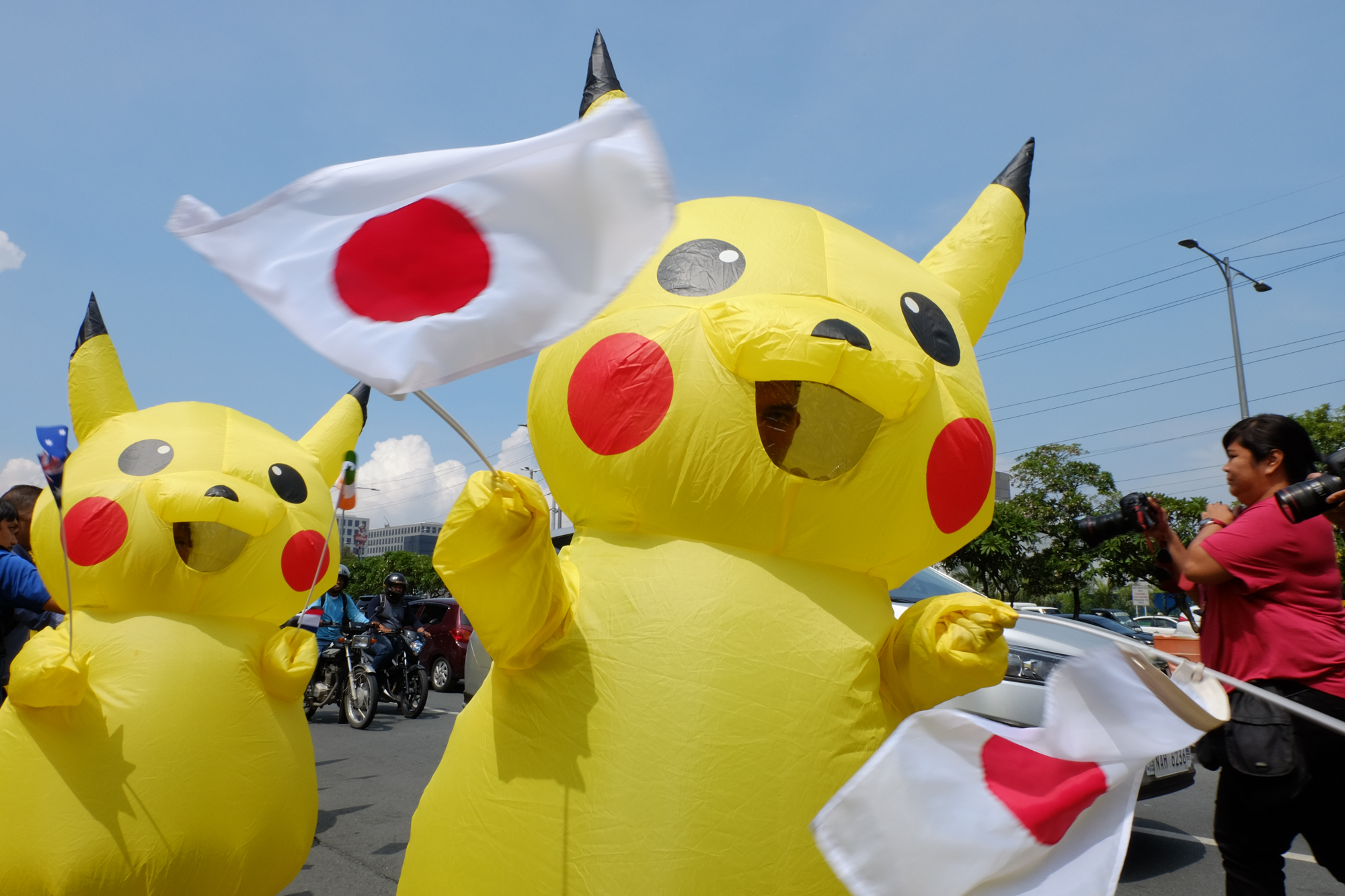By Lynne Brasileño, 350 Pilipinas volunteer
I woke up this morning and found out that various local and international media networks featured the solidarity action that the 350.org Pilipinas volunteers performed yesterday in front of the Japanese Embassy. Initially, I volunteered to put on the costume because first, it was always my dream to cosplay a Pokémon and secondly, in my heart I understood why Pikachu was selected as an icon for the campaign when the idea came up. Because this pocket monster was so cute, it had of course, captured the attention of the media and the public earning the act features in local newspapers, online-news websites, social media, and even the local primetime news.
However, the feat has also gained attention from various critics as to how Pikachu was politicized and appropriated in this context. What does a cuddly pocket monster have to do with the call for the Japanese government to act as a climate leader and to divest from the use of dirty energy? Many people would raise their eyebrows at this thought, trying to figure out the links of such symbols.

My nine-year-old self might not be as articulate as my adult version now, but unbelievably, my later life could learn so much from my childhood. I first encountered Pikachu and the other pocket monsters one Friday evening in an animated series shown in one of the local channels. Yes, I encountered Pokémon on TV and I did not own devices for video games and role-playing games yet at that time. I did not have enough money for Pokémon cards either. With whatever I had saved up from Christmas money, I eventually spent buying small plastic toys and finally my very own life-sized Pikachu stuffed toy. I also invested on posters which outlined all 150 Pokémon featured in the animated series. I did my share of consumption, succumbing to consumerist culture in my young age. Nevertheless, I suppose it was not just all about consumerism and apparent propagation of violence in Pokémon battles as some people may view it. To me, Pikachu was not just a toy or a cartoon character, he and the other pocket monsters were guardians. They were companions, teaching young children about lessons in friendship, empathy, and respect for nature.
Growing up in the province, I have spent many summers in the farm of my grandparents. I was raised to take care of and playing with chicken, cattle, pigs, dogs, and cats in the backyard. If there is one thing that I can relate to in the animated series, it was that most gym leaders and trainers took good care of their Pokémon. My younger self would tell you that there are many lessons learned from the early TV show episodes, much of it beyond the cuteness or fierceness of these pocket monsters. Initially, for those of you who had grew up with the TV series, you would note that Ash Ketchum could not keep Pikachu inside a Pokéball. You might think of Pikachu as stubborn but later on you would realize how a friendship was slowly being formed between Ash and Pikachu and that went beyond their differences as human and pocket monster. They fought their opponents side-by-side and not just as a pocket monster following the orders of his trainer. Looking back into the TV series, as I do not have enough headspace to outline all the episodes, there were many instances when stewardship for the environment and wildlife were highlighted. Just try to rewatch Season 1 of the animated series as an adult and you will perceive issues such as animal cruelty, heritage preservation, place-making, and environmental destruction to name a few. I honestly do not know the real intentions of the show makers and the game creators, but remembering these episodes fondly and realizing my perceived underlying concepts; I believe that they have influenced many other children as well.

In a conference that I have attended, I have learned that the Japanese culture is considered as a privileged culture in this era. A lot of content in manga, anime, and live action series have not only influenced fandoms worldwide but have also taught children and adults about certain values. Let us not forget that all the pocket monsters are characterized by certain elements, fire, water, air, earth, electricity, etc. They all have their strengths and their weaknesses depending on their habitats and skills. Most of these pocket monsters are actually derived from animals, both actual and mythical. We see these inspirations every day, domesticated and in the wild but like human beings, and we are all affected by climate change. What’s the inspiration for Pikachu? It was revealed that Pikachu was adapted from a rodent or a squirrel. In this case, this article has outlined that a mammal called the American Pika has its habitat destroyed due to the effects of climate change on its habitat.
“We see these inspirations every day, domesticated and in the wild but like human beings, and we are all affected by climate change.”
I have to admit that I did not play the current Pokémon video games produced recently, nor did I watch the Hollywood adaptation of these beloved characters. Looking back to my childhood, I could still remember the lessons taught to me by the animated series. Lessons on friendship, respect for nature and all other creatures, and environmental stewardship has somehow dawned from all those evenings spent in front of the television. In my depoliticized standpoint, Pikachu is a guardian, Pikachu is my champion; though he may not be as apparent as Captain Planet or as particular as Ferngully or Pocahontas. Despite being an electric pocket monster who can shock you or destroy you via electrocution, Pikachu also has this adorable appearance and endearing attitude. As an electric Pokémon, Pikachu stands for our recurrent need for energy to function in our daily lives. Pikachu is a metaphor here; we can still produce energy by being non-threatening and non-destructive, right? There are better ways, such as divesting from coal and investing in renewable sources. The symbolisms in this animated series has so much to do with Japanese values. Therefore, when I was invited for a march and dress up as Pikachu, I could not pass up the suggestion. It typically makes sense when you wear a symbol that you actually believe in and understand. It was a creative way, it was non-threatening, and it actually made sense to me.
“In my depoliticized standpoint, Pikachu is a guardian, Pikachu is my champion; though he may not be as apparent as Captain Planet or as particular as Ferngully or Pocahontas… Pikachu is a metaphor here; we can still produce energy by being non-threatening and non-destructive, right? There are better ways, such as divesting from coal and investing in renewable sources.”

I had been far detached from my quiet and simple life in the rural countryside. As an adult, I am now bombarded with so many health and environmental issues in the urban jungle that I call home. But this simple note from my childhood reminds me so much of the lessons that I learned from the shows that I watch and the toys that I play with. Right now, my life-sized Pikachu toy sits in my two-year-old nephew’s bedroom. I am hoping to introduce him soon to the lessons that I have learned from Pikachu and the other pocket monsters.
So, what does Pikachu have to do with Japan’s climate leadership in the upcoming G20 Summit? If I have not shared enough, sit down and watch a few episodes of the animated series and maybe your way of thinking would eventually evolve as the pocket monsters do.
All photos by AC Dimatatac/350.org
